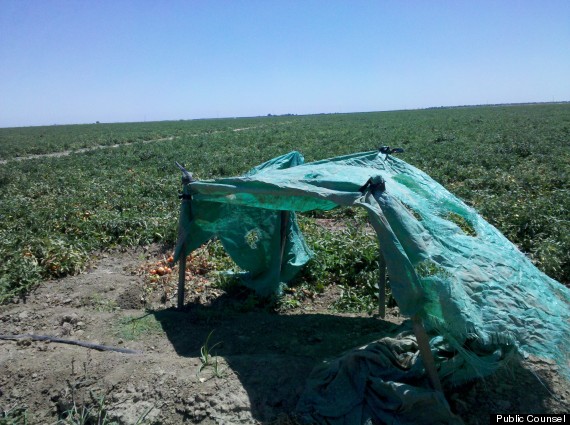
Sixteen-year-old Nicholas Chavez had a summer job in 2011. But unlike many boys his age, Nicholas' summer job consisted of helping his parents pick bell peppers in the scorching fields outside Bakersfield, California.
Last July, with temperatures still above 106 degrees in the evening, Nicholas joined his parents for a nine-hour shift starting at 6:00 p.m. Three hours later, Nicholas felt sick from the heat and the lack of water, and began to vomit. The farm labor contractor and foreman left him at the side of the road, and told him not to return the next day. Nicholas later told the United Farm Workers, "They never offered to take me to the hospital or give me fresh water, they just laughed at me. I was very afraid of falling asleep and not waking up. I didn't want to worry my mother, because if she stops working, she would lose her job."
Nicholas' fears weren't far off the mark. Both of his parents were fired the next day, and the foreman refused to pay them for much of their work.
Nicholas was actually one of the lucky ones. Each year, in a repeating tragedy that can and should be prevented, hardworking men, women (and even children) who put food on our tables die of heat illness in the fields of California. Countless others are unnecessarily exposed to the serious health effects of heat edema (swelling in the legs), heat syncope (sudden loss of consciousness), heat exhaustion or stroke. This year is no different. In June, a farmworker collapsed in a field in 100-plus degree heat and died soon thereafter outside of Fresno.
Farm worker organizing led to California's first-in-the-nation heat illness regulation, which was passed in 2005 after five heat-related deaths that year. It's supposed to guarantee water, shade, and rest for all outdoor workers, including the state's 650,000 farm workers.
So why are people still getting sick and dying? To find out, first you have to look at how farming works in California. Across this agricultural breadbasket, big farms outsource hiring to farm labor contractors. A disturbingly large number of these contractors are not following the rules. And this broken system lets farmers and contractors point the finger at each other.
The regulation is fairly straightforward: one quart of water per hour, education for workers to know they can ask for shade or rest when they are suffering, and access to at least five-minutes of shade for those "suffering from heat illness or believing a preventative recovery period is needed." Not too much to ask. Even so, according to court documents, nearly 40 percent of the farms inspected in 2008 by the California Department of Occupational Safety and Health (Cal/OSHA) had heat-related violations.
Here's an example of what some employers try to pass for "shade" out in the fields:

Unfortunately, what Cal/OSHA does - or doesn't do -- when it finds workers without water, shade, or rest is the other problem. Although the agency is required to investigate complaints within three days, it rarely does so. In fact, it admitted to the Los Angeles Times that, over the last several years, 89 of 185 heat complaints filed with the agency did not result in inspections (Los Angeles Times, "Change Slow for Farmworkers." September 14, 2011). When farms are inspected and cited, the citations are too often insufficient, and even repeat offenders - those with 5, 6, 7 or more citations - are not cited as "willful" or "repeat" under the statute. Adding insult to injury, based on a review of court documents, a large proportion of citations are later reduced by the agency when the contractors dispute them or appeal.
To address Cal/OSHA's inaction, Public Counsel and the law firm of Munger, Tolles & Olson are currently representing the United Farm Workers and individual farm workers in a lawsuit that seeks to compel enforcement of this life-saving regulation.
Heat illness is getting attention in the California Legislature too. Assemblymember Betsy Butler has authored the Farm Worker Safety Act, which addresses both the weakness of the current regulation and the state's failure to enforce it. Visit her website "Thirst for Justice."
The act would hold both contractors and growers accountable when they let outdoor workers go without water, shade, or rest. It also would let farm workers take legal action against a contractor or grower when Cal/OSHA fails to respond. The goal isn't to punish growers who are following the rules or to generate more lawsuits, but to prevent heat illness.
"You really have to understand what farm labor looks like to know why the state isn't doing enough, and why we need this bill," UFW President Arturo Rodriguez told me recently. "Heat illness can happen in just minutes, and by the time inspectors come out to a farm it's too late. Every day the problem isn't fixed people's risk of dying or becoming seriously ill just goes up. The Farm Worker Safety Act would achieve something farm workers have desperately needed for decades. Farm workers are in the best position to know when there's not enough water, shade and rest and there's a dangerous situation. Doesn't it make sense to give them a stronger voice?"
The California Assembly has already passed the bill. Now it's up to the Senate to approve the bill and the Governor to sign it. Let's keep the heat on them until that happens. If this bill becomes law, California can once again be a national leader on protecting the rights and the lives of its hardest working residents. California's farm workers deserve nothing less.